
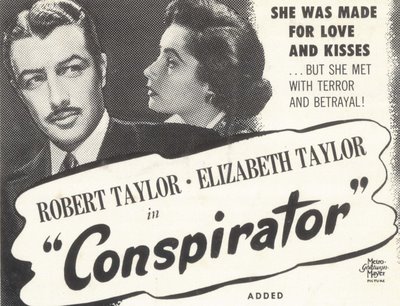
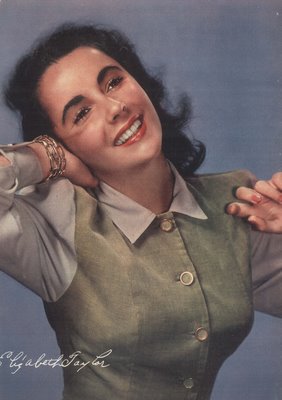
Liz Loose In London
Nobody talks about Conspirator anymore, but they sure did when it was new in 1950. Actually, it wasn’t new then, filming having started back in November 1948 and then withheld from release for over a year. Perhaps they wanted to spare audiences the shock of seeing a just-turned seventeen Elizabeth Taylor in the arms of thirty-seven year old Robert Taylor. Delaying the open may also have been recognition of the fact they had a weak picture that needed to play off quietly before the real grown-up showcase for Liz, Father Of The Bride, bowed in June of ’50. Whatever the reason, Conspirator was still big news for Taylor's fan base, whose excitement over the teenage star could only be quenched by reams of location and behind-the-scenes profiles celebrating her trip to England and first-time adult role opposite veteran Bob. The intensive marketing of average (or below that) pictures was certainly nothing new in 1950 --- goodness knows we have more of it today than ever --- but fan magazine coverage from that era reveals a lot about how the product was sold and who they were targeting. With Conspirator, it was teenage girls in the crosshairs of those monthlies; invited to share in the fantasy romance of an actress still in school whisked overseas to play at being a woman married to Robert Taylor. The British shoot was necessitated by that country’s freezing of Metro exhibition receipts collected in U.K. theatres --- such money could not be brought home --- it had to be reinvested in production over there, thus providing employment for native cast and crew. Conspirator had a British director (Victor Saville) and co-stars --- note the group taking tea here during a break in filming --- that girl on the right is a young Honor Blackman, her Pussy Galore still fifteen years in the future when she made this.
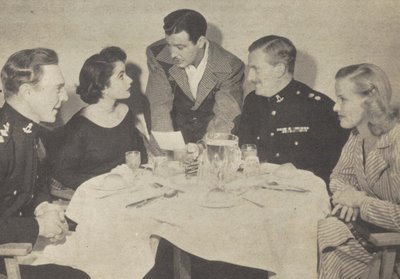
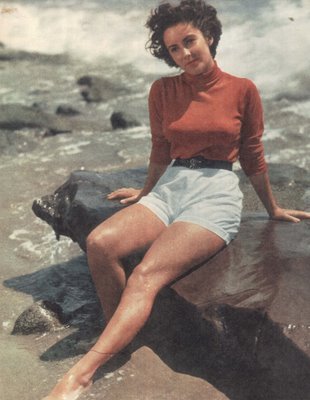
Metro had to fend off a militant Los Angeles Board Of Education when time came to book Elizabeth Taylor’s passage to England. As she was still a minor, there were provisions made for her schooling, this where the schoolmarm below with Liz comes in. Her name was Miss Bertina Anderson, and columnists of the day assured us that she was accredited and experienced (small comfort there --- as most of my teachers were as well, but that didn’t modify foul dispositions or sadistic inclinations displayed by not a few of them). Miss Anderson is pointing out their destination here on the map. Yes, it looks like England, all right. I’m not so sure how Bertina’s lessons took with Liz, having been reminded of an interview I once read where Shelly Winters said the only thing she ever observed Taylor reading were the trades. However futile her instruction may have been (even with Robert Taylor’s help, as illustrated), the venerable educator is said to have strictly maintained the three-hour a day schooling that was observed in bite-sized increments between takes. As you’ll note from these stills, Liz made quite a splash around London-town, whether standing in queue for ration tickets (no way they’d let her starve in any event) or posing with guards at Buckingham Palace.

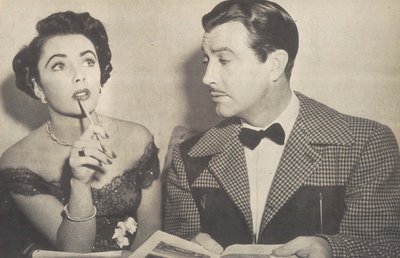
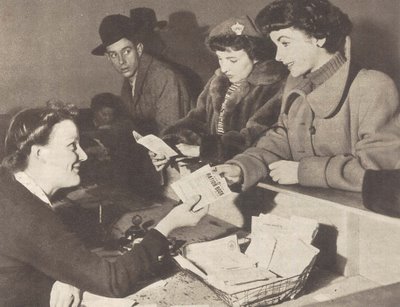

Liz may have looked the part of a grown woman, but didn’t quite have the voice to pull it off. She made Margaret O’Brien sound like Mercedes McCambridge by comparison. Liz was seventeen playing eighteen and acting like twelve. It’s difficult to fathom Robert Taylor’s interest in her --- wait a minute, what am I saying? After all, Bob did request of the cameraman that he shoot only from the waist up (Bob was 37 playing 31 and acting 17). Liz later said their love scenes were somewhat enlivened by her leading man’s tongue having wandered very near her tonsils. Further on-set complications included a Bob/Liz tangle wherein our girl’s bathrobe opened wide to reveal a breathtaking physical landscape surely the equal of any natural wonders to be found amongst the British Isles. The footage was carefully inspected back in Culver City… very carefully inspected. After twelve or so months of detailed consideration and repeated viewing, executives decided that the offending moment would, indeed, have to be discarded (never mind London After Midnight and The Rogue Song --- let’s find this!).
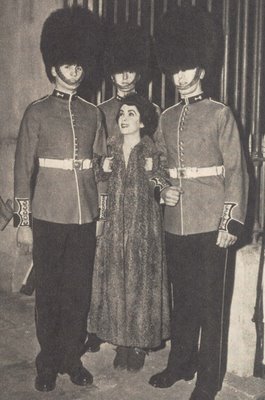
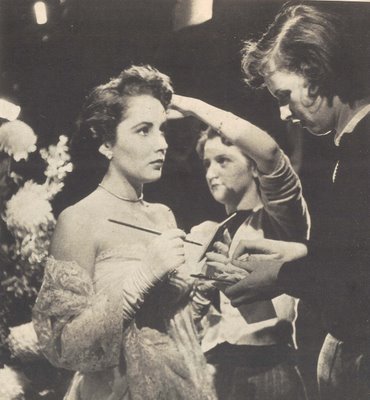
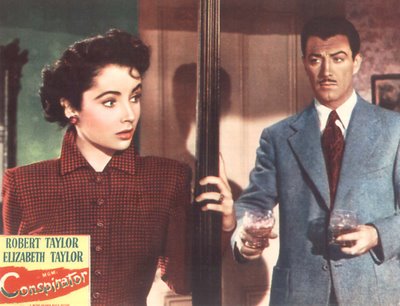
Well, I’ve ignored Conspirator itself so far, but you shouldn’t, as it’s one peach of a cold war Gaslight retread that pits child bride Liz against Communist traitor husband Bob, with England’s very future at stake. He’s a dashing British army officer, but that’s just on the surface. At night, he sneaks off to confer with spies in a Hammer-friendly back street London where I kept expecting Michael Ripper to turn up as a chimney sweep or barman. Here’s the question that nags --- why would a cool cat like Bob, decked out in tailored uniforms and practically tripping over medals and promotions (not to mention Liz awaiting him in their marital bed) want to tie himself up with a lot of cheerless Soviets, forever coming off with the same lines --- One never questions the party … It is not permissible for you to fail again. Do Communist operatives function this way in real life, and if so, how do they ever get recruits? Rest assured Rotarians or Kiwanians would fast lose their membership if leaders acted so high-handed as this. So what’s in it for Bob, I kept asking myself, finally accepting the fact I’d never make a good Party man. What screen Reds needed was charismatic, outwardly gracious, silken-voiced representatives along the lines of Sydney Greenstreet, Otto Kruger, or Claude Rains, rather than weasely, dogmatic functionaries (Hitchcock got it right when he used James Mason in North By Northwest). Ever notice how Reds are always trafficking in microfilm or really tiny pieces of paper inserted within seemingly tinier pieces of paper. Like Grant Williams, their communiqués seem to shrink into a kind of infinity, and you’d think it would take a field trip to Mount Palomar to decode some of these messages. Of course, Liz stumbles across one of them in Conspirator, and showing quite remarkable perception for such an otherwise clueless character, promptly unmasks and reveals Bob’s perfidy (while they’re alone, of course, thus putting her life in immediate jeopardy). It’s all done in that over-the-top, higher octave woman’s gothic style of the Dragonwyck school, but this time with spies and espionage providing the Deus ex Machina. Conspirator is an obscure, but delightful, Metro star vehicle with a lot more to offer than its modest reputation would suggest, and it comes on TCM quite a lot. Well worth catching the next time if you’ve not seen it …
0 Comments:
Post a Comment
<< Home